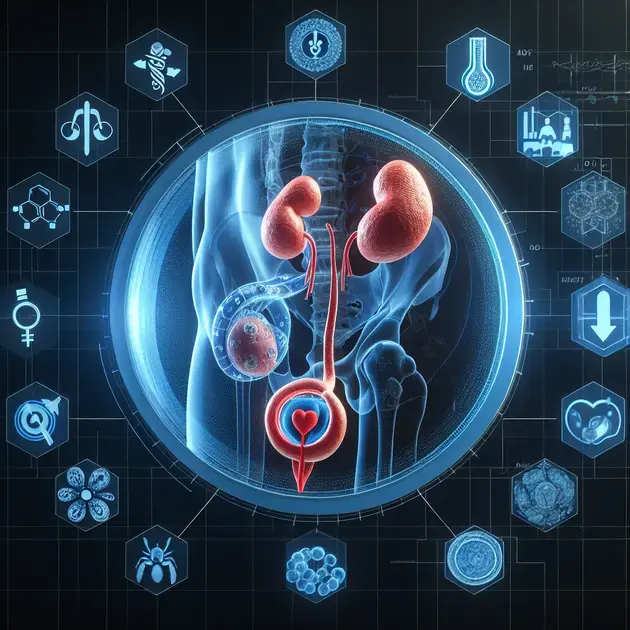Understanding the connection between the prostate and urethra is crucial for maintaining overall male health. The prostate gland, located beneath the bladder, plays a key role in male reproductive function by producing fluid that nourishes and protects sperm. On the other hand, the urethra is the tube that carries urine from the bladder and semen from the reproductive system out of the body.
Recent studies have shown that disorders affecting the prostate, such as prostatitis or enlarged prostate, can have a direct impact on the urethra. This relationship underscores the importance of comprehensive care and regular check-ups to ensure the well-being of these interconnected components. By understanding the intricate connection between the prostate and urethra, individuals can take proactive steps towards maintaining a healthy genitourinary system.

**
Exploring the Prostate’s Vital Functions
**
Understanding the Prostate Gland
The prostate gland plays a crucial role in male reproductive health by producing a fluid that protects and nourishes sperm. To explore the vital functions of the prostate, consider using a reputable medical website such as Mayo Clinic. Here, you can find detailed explanations and illustrations of the anatomy and functions of the prostate gland.
Importance of Prostate Health
Maintaining a healthy prostate is essential for overall well-being. Schedule regular check-ups with your healthcare provider to monitor prostate health. Websites like WebMD provide comprehensive guides on lifestyle changes and preventive measures to support prostate health.
Common Prostate Health Issues
Prostate disorders such as prostatitis, benign prostatic hyperplasia (BPH), and prostate cancer can impact daily life. Learn more about these conditions on the American Cancer Society website, which offers valuable insights and resources for individuals facing prostate health challenges.
Diet and Prostate Health
Eating a balanced diet rich in fruits, vegetables, and lean proteins can support prostate health. Explore recipes and nutritional tips for prostate health on the Prostate Cancer Foundation website. Incorporating these dietary changes can contribute to better prostate function.
Physical Activity and Prostate Well-being
Regular exercise is beneficial for prostate health and overall genitourinary well-being. Use fitness apps like MyFitnessPal to create personalized workout routines. Staying active can improve circulation to the prostate gland and reduce the risk of prostate disorders.
**
The Impact of Prostate Disorders on Urethral Health
**
Understanding Urethral Function in Prostate Disorders
Prostate disorders can affect urethral health by causing urinary symptoms such as frequent urination or difficulty urinating. Visit the National Institute of Diabetes and Digestive and Kidney Diseases website to learn more about how prostate conditions impact urethral function.
Treatment Options for Urethral Complications
If prostate disorders lead to urethral complications, various treatment options are available. Consult a urologist to discuss potential interventions. Websites like Healthline offer detailed articles on urethral health and treatment modalities for prostate-related urethral issues.
Preventive Measures for Urethral Infections
Urethral infections can occur as a result of prostate disorders. To prevent such infections, practice good hygiene and stay hydrated. Explore resources on the Centers for Disease Control and Prevention (CDC) website for tips on preventing urethral infections in the context of prostate health.
Impact of Urethral Health on Quality of Life
Urethral health plays a significant role in maintaining quality of life for individuals with prostate disorders. Understanding the importance of urethral care can help prevent complications and improve overall genitourinary well-being. For in-depth information on the interplay between prostate disorders and urethral health, refer to the Urology Care Foundation website.
Support Resources for Urethral Health
Seek support from urological health organizations or online communities to address urethral health concerns related to prostate disorders. Platforms like Inspire provide forums for individuals to share experiences and connect with others facing similar genitourinary challenges.
**
Taking Proactive Steps for Genitourinary Well-being
**
Regular Health Screenings for Genitourinary Health
Schedule routine health screenings, including prostate exams and urine tests, to monitor genitourinary well-being. Healthcare providers can offer guidance on preventive measures and early detection of any potential issues. Utilize health apps like Zocdoc to conveniently schedule appointments for genitourinary screenings.
Healthy Habits for Genitourinary Well-being
Practicing healthy habits such as staying hydrated, maintaining a balanced diet, and engaging in regular physical activity can support genitourinary health. Use nutrition tracking apps like Lose It! to monitor dietary choices and ensure optimal nutrient intake for genitourinary well-being.
Mental Health and Genitourinary Well-being
Addressing mental health is essential for overall genitourinary well-being. Seek counseling or therapy services to manage stress and anxiety, which can impact genitourinary health. Explore telehealth platforms like BetterHelp for convenient access to mental health professionals specialized in genitourinary-related concerns.
Education and Awareness on Genitourinary Health
Stay informed about genitourinary health by accessing reliable healthcare resources and attending educational seminars. Websites like Health.gov provide public health guidelines and recommendations for promoting genitourinary well-being. Educating oneself on genitourinary health can empower individuals to make informed decisions about their overall health.
Community Support for Genitourinary Health Advocacy
Engage in community initiatives and advocacy efforts to raise awareness about genitourinary health. Join online genitourinary health forums or participate in fundraising events for genitourinary health organizations. Through collective action and support, individuals can contribute to improving genitourinary well-being at a broader societal level.

**Unraveling the Link Between Prostate Inflammation and Urethral Obstruction**
Understanding Prostate Inflammation and Urethral Obstruction
Prostate inflammation, also known as prostatitis, is a common condition that affects men of all ages. It can be caused by bacterial infections, lifestyle factors, or other underlying health issues. When the prostate becomes inflamed, it can lead to a variety of symptoms such as pain in the pelvic area, difficulty urinating, and frequent urination. In some cases, untreated inflammation can progress to urethral obstruction, a serious condition that can disrupt the flow of urine from the bladder.
Urethral obstruction occurs when there is a blockage in the urethra, the tube that carries urine from the bladder out of the body. This blockage can be caused by factors such as an enlarged prostate, scar tissue, or urinary stones. When the urethra is obstructed, it can result in significant discomfort, urinary retention, and complications such as kidney damage.
It is important to understand the link between prostate inflammation and urethral obstruction to effectively manage and prevent these conditions. By addressing prostate health and seeking timely medical care, individuals can reduce the risk of urethral complications and maintain optimal urinary system function.
Preventive Measures for Urethral Complications Related to Prostate Enlargement
Preventing urethral complications related to prostate enlargement starts with proactively managing prostate health. Regular prostate screenings, healthy lifestyle choices, and proper hydration can help reduce the risk of inflammation and enlargement. Additionally, maintaining a balanced diet rich in antioxidants and nutrients can support prostate health and overall urinary function.
If diagnosed with prostate enlargement, also known as benign prostatic hyperplasia (BPH), it is essential to follow a treatment plan prescribed by a healthcare provider. This may include medications, lifestyle modifications, or in severe cases, surgical intervention. By addressing BPH early on, individuals can prevent progression to urethral complications and maintain a high quality of life.
Moreover, practicing good urinary habits such as emptying the bladder completely, avoiding holding urine for extended periods, and practicing pelvic floor exercises can also help prevent urethral issues associated with prostate enlargement. By taking a proactive approach to prostate and urinary health, individuals can reduce the likelihood of urethral obstruction and its associated complications.
Maintaining Urinary System Harmony: A Guide to Prostate and Urethra Health
Maintaining urinary system harmony involves a comprehensive approach to prostate and urethra health. This includes regular check-ups with a healthcare provider to monitor prostate function, screening for potential risk factors, and discussing any urinary symptoms experienced. By staying informed about prostate health and addressing issues promptly, individuals can better prevent complications and maintain urinary system harmony.
In addition to medical care, lifestyle factors play a crucial role in promoting prostate and urethra health. Engaging in regular physical activity, managing stress levels, and avoiding excessive alcohol and caffeine consumption can positively impact urinary function. Adequate hydration is also essential for supporting urinary flow and reducing the risk of urethral complications.
Overall, by prioritizing prostate and urethra health through proactive measures, individuals can prevent inflammation, enlargement, and urethral obstruction. Educating oneself about the link between these conditions and taking steps to maintain urinary system harmony are key strategies for promoting long-term wellness and quality of life.
**
Conclusion
**
Understanding the correlation between prostate inflammation and urethral obstruction is paramount in managing and preventing these conditions effectively. Prostate inflammation, or prostatitis, can lead to symptoms like pelvic pain, urinary difficulties, and frequent urination, potentially progressing to urethral obstruction if left untreated. By addressing prostate health promptly and seeking medical attention, individuals can mitigate the risk of urethral complications and maintain optimal urinary function.
Preventive measures for urethral complications stemming from prostate enlargement involve proactive management of prostate health through regular screenings, healthy lifestyle choices, and adequate hydration. A well-balanced diet rich in antioxidants and nutrients can support prostate health, while following a treatment plan for prostate enlargement, such as benign prostatic hyperplasia (BPH), is crucial. Good urinary habits like complete bladder emptying, avoiding prolonged urine retention, and pelvic floor exercises can aid in preventing urethral issues associated with prostate enlargement.
Maintaining harmony in the urinary system entails a comprehensive approach to prostate and urethra health. Regular check-ups with healthcare providers, screening for risk factors, and prompt addressing of urinary symptoms are vital steps in preventing complications and sustaining urinary system harmony. Lifestyle factors, including physical activity, stress management, and moderation of alcohol and caffeine intake, play pivotal roles in promoting prostate and urethra health. Adequate hydration is also key for supporting urinary flow and minimizing the risk of urethral complications, ultimately enhancing long-term wellness and quality of life.